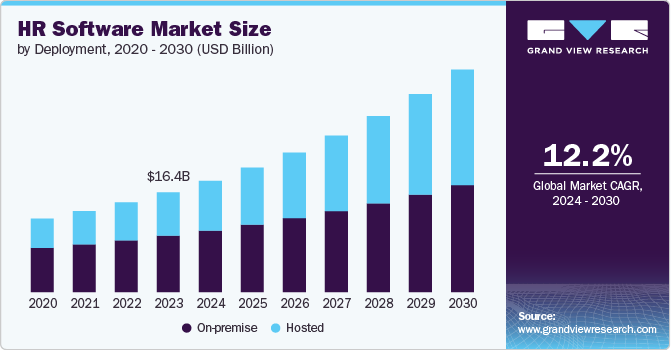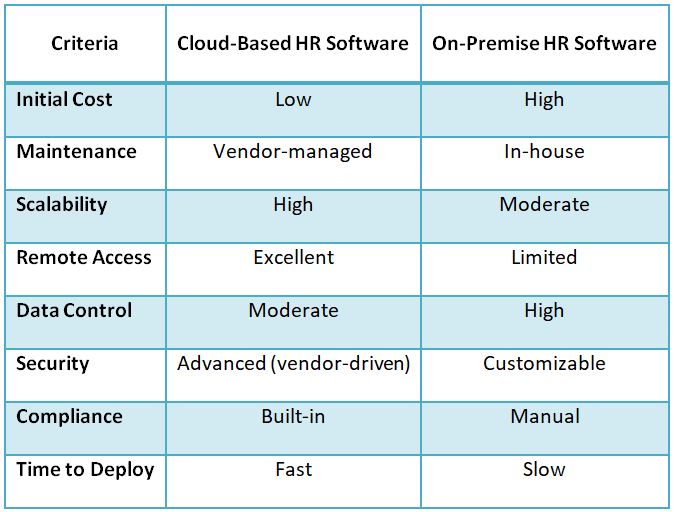
In the rapidly evolving Human Resource Management (HRM) landscape, choosing between cloud-based and on-premise HR software in India is a critical decision for modern businesses. The right HR management software in India can streamline payroll, compliance, and employee engagement—helping companies save costs, boost productivity, and adapt to India’s evolving digital landscape. HR management software tools serve companies of diverse shapes and sizes; thus, it is extremely essential to opt for the best HR software in India to streamline your day-to-day HR tasks and free up space and time for other important tasks.
Cloud-based HR software can be hosted on remote servers connected to the internet. This means that the software and its data are managed by a third-party vendor, and companies can access the software online. This model enables employees and HR personnel to access HR services from anywhere, at any time, making it an excellent choice for businesses with remote workforces or widespread global operations in Bengaluru, Mumbai, Delhi, Pune, and Tier 2 cities across India.
In today’s rapidly evolving business landscape, choosing the right HR software is more than a technical decision— it’s a strategic one. With the rapid surge of digital transformation and remote work, Indian businesses are increasingly weighing the pros and cons of cloud-based vs. on-premise HR software. But which solution truly delivers the best value?
This article examines the cost-benefit analysis, remote work compatibility, and data security of both models, allowing you to make well-informed decisions tailored to your organization’s needs.
Also Read: Building a Culture of Growth: How HRMS Empowers Employee Training and Employee Development?
HR software in India has seen exponential growth in adoption, driven by the need for automation, compliance, and employee engagement. From payroll processing to performance management, HR tools are now central to operational efficiency.
There are two primary deployment models:
Each comes with its own set of advantages and limitations, especially in the Indian business context.

Source: Grandviewresearch.com
Cloud-based HR software can be easily hosted on remote servers connected via the internet. This means that the software and its crucial data are managed by any third-party vendor, and companies can access the system online. This model enables employees and HR personnel to access an extensive range of HR services from anywhere, at any point in time, making it an excellent choice for diverse businesses with remote workforces or global operations.
One of the top advantages of cloud-based HRMS software is the cost savings. On-premise software requires organizations to invest a substantial amount in hardware and IT infrastructure, whereas cloud solutions are typically subscription-based. A cloud-based HR solution in India eliminates the necessity for heavy capital expenditure. Small and medium-sized businesses find that the HRMS products are more cost-effective.
Cloud HRMS is perfect for businesses that employ remote and on-field workers. Internet access enables employees to access the HRMS dashboard from anywhere, allowing them to stay connected and informed. From leave balance information to payslip and the other HR services, employees can access all the information at their convenience.
Cloud HRMS software can easily scale to accommodate your company’s needs as you add new employees or expand your business. Some companies offer diverse subscription-based plans to meet current business requirements and provide customers with the flexibility to upgrade to a different plan as their team’s size increases. In this way, management can invest in a subscription plan that suits their needs and also doesn’t have to worry about transferring data to a new system if the company expands in size.
If a company invests in cloud HR systems, the system maintenance, security patches, and updates will be carried out automatically. The IT teams don’t have to spend their valuable time managing such work to keep the systems up and running.
Prioritizing a positive employee experience, the cloud-based HR systems incorporate built-in self-service functions. Employees can very conveniently access their payslips and update their data online, fostering engagement and efficiency.
Also Read: Why Businesses Are Switching to Cloud-Based Employee Performance Management Systems in Kolkata
Data security is the primary concern for individuals when considering the purchase of cloud-based HR software solutions. Most organizations require a trusted vendor with high security measures. If organizations handle sensitive employee data or operate in highly regulated industries, it may pose a challenge.
Since the cloud HRMS systems require an internet connection, any connectivity issues could obstruct your access to HR services. For businesses operating in the areas with unreliable internet, this could be a considerable drawback.
Cloud-based HRMS systems may offer some degree of customization, but they are generally less flexible compared to on-premise solutions. If your organization requires highly specific features or custom workflows, a cloud-based solution might not have the capability to fully meet your needs.
On-premise HRMS software is installed and also hosted on your organization’s own servers. This means that the software is managed and maintained solely by your internal IT department, and all data is stored within your organization’s infrastructure. On-premise solutions offer a much higher level of control and customization, but they also come with significant responsibilities.
With on-premise HRMS, your organization has complete control over the system, from the software to the data. This is particularly important for businesses that must comply with highly stringent data privacy regulations or those that require very highly customized features.
On-premise systems keep sensitive data within your business’s own infrastructure, meaning that there is no dependency on third-party providers to manage your crucial data. If your company is in a highly regulated industry or handles highly sensitive employee information, having direct control over your crucial data may be more appealing.
From the workflows to user interfaces, on-premise systems are significantly more flexible in terms of customization compared to the cloud-based solutions. This can be a major advantage for larger organizations with more complex HR requirements.
On-premise HRMS software implementation typically costs a significant amount. Besides software purchases, the company must invest in hardware devices, server infrastructure, and a very dedicated IT professional to maintain better workforce management. Small and medium-sized businesses may find it extremely challenging to allocate a generous budget.
IT departments have a huge responsibility for managing software updates, patches, and system maintenance. It is also better to invest in on-premise software with minimal maintenance requirements compared to a dedicated IT team with a higher workload.
On-premise HRMS systems are generally only accessible from within the company’s network. If employees are working remotely or across different locations, they may struggle to access the different HR services unless a Virtual Private Network (VPN) is available. This could create additional hurdles for the different businesses with a distributed workforce.
Investing in the top HR software in India brings numerous benefits that modern businesses can’t afford to overlook. HR software helps streamline HR processes, automate administrative tasks, and improve overall productivity. Whether you’re managing payroll, tracking attendance, or evaluating employee performance, the right software can make a significant difference.
| Feature | Cloud-Based HR Software in India | On-Premise HR Software in India |
|---|---|---|
| Initial Cost | Low (subscription) | High (hardware + setup) |
| Accessibility | Anywhere with internet | Limited to office/VPN |
| Security | Vendor-managed with encryption | Company-managed |
| Updates | Automatic | Manual |
| Scalability | Easy to scale | Hardware dependent |
Indian labor laws are constantly evolving. The top HR software in India ensures that your business remains compliant with the most up-to-date regulations, reducing the risk of penalties or any legal issues.
With automated payroll processing, attendance management, and employee records, HR professionals can focus more on strategic functions, such as talent acquisition and development.
Many HR software platforms offer employee self-service portals, enabling employees to easily access their leave balances, pay stubs, and benefits.
When evaluating the top HR software in India, businesses often need to decide between on-premise and cloud-based solutions. Both options offer distinct advantages, and the decision hugely depends on the specific needs of your organization.
Cloud-Based: Typically subscription-based (monthly or annual). Minimal upfront costs.
On-Premise: Requires significant capital expenditure for hardware, software licenses, and IT infrastructure.
Cloud-Based: Updates are automatic and included in the subscription. No need for dedicated IT staff.
On-Premise: Requires manual upgrades, often involving downtime and additional costs.
Cloud-Based: Easily scalable. Add the users or modules as your business expands and evolves.
On-Premise: Scaling requires hardware upgrades and software reconfiguration.
Cloud-Based: May include data storage limits or premium support fees.
On-Premise: Energy consumption, physical space, and IT salaries add to long-term costs.
Verdict: For startups and SMEs in India, cloud-based HR software offers a more cost-effective and scalable solution. Enterprises with legacy systems may still prefer on-premise for control and customization.
Cloud-based HRMS and on-premise HRMS are the two of the most popular options in India. To choose between the two, identify the factors that define each solution and determine which one suits the firm.
Assess the size of your firm. A growing firm with multiple cloud-based solutions can find better options. An on-premise solution may be the right choice in such situations.
An on-premises system requires manual searching for new patches and incurs additional fees for updates. In contrast, the cloud-based HRMS systems do not require manual labor and are often provided at no additional cost.
While the on-premise HR management permits you to manage your data, you are solely responsible for any loss of vital data or security breach. On-cloud HR enables easier data backup compared to on-premises servers.
A cloud-based HR solution would require constant internet connectivity. While on-premise systems can be installed and used offline.
Cloud HRMS offers a monthly contract, eliminating the need to purchase it if unused. An on-premise management system necessitates payment for extra software and hardware.
In the case of an on-premise HR solution, the expenditure is often capitalized and its value depreciated over time. In contrast, with a cloud HR system, you can access it online and make changes at any time.
Although the cloud-based HRMS systems may have a much lower initial cost, on-premises solutions can be more affordable in the long run. They often outperform the cloud-based systems in terms of long-term ownership costs.
India’s workforce is increasingly hybrid. Whether it’s IT hubs in Bengaluru or remote teams in Tier 2 cities, flexibility is key.
Cloud-Based: Accessible from anywhere, anytime with an internet connection. Ideal for remote teams.
On-Premise: Limited to office networks unless configured with VPNs or remote access tools.
Cloud-Based: Real-time data sharing, mobile apps, and integrations with tools like Slack or Zoom.
On-Premise: Collaboration features are often limited or require third-party add-ons.
Cloud-Based: Self-service portals, mobile access, and intuitive interfaces enhance engagement.
On-Premise: May lack modern UX/UI unless heavily customized.
Verdict: Cloud-based HR software is the clear winner for remote work compatibility, especially in India’s geographically diverse workforce.
Security is the topmost concern for Indian businesses, particularly with the rising prevalence of cyber threats and evolving data protection laws.
Cloud-Based: Leading providers comply with GDPR, ISO, and India’s Personal Data Protection Bill.
On-Premise: Compliance depends on internal IT policies and regular audits.
Cloud-Based: Data is stored on third-party servers. Ownership terms vary by provider.
On-Premise: Full control over data storage and access.
Cloud-Based: Redundant backups, disaster recovery, and 24/7 monitoring.
On-Premise: Risk of data loss due to hardware failure or inadequate backup protocols.
Cloud-Based: Advanced encryption, multi-factor authentication, and intrusion detection.
On-Premise: Security depends on internal expertise and investment.
Verdict: While on-premise offers more control, cloud-based solutions often provide superior security features and compliance support, especially crucial for businesses handling sensitive employee data.
India’s HR tech market is booming, with cloud adoption leading the charge. Key trends include:
Companies across sectors—from IT and manufacturing to retail and education—are embracing cloud-based HR software for its agility and innovation.
A reliable cloud-based solution can be a game changer. Unless your business conducts its internal operations in at least three premium-quality data centers that are manned 24/7 by engineers and guardians, there’s arguably nothing to beat SaaS for reliability and safety. Businesses are particularly important since they have a dispersed workforce spread across different time zones; therefore, reducing potential downtime is vital if the business is to continue running and teams remain productive.
As a result, one must focus on cost structures, security posture, and reliability issues when seeking the best option for running the HRM software. Your choice must always align with the specific requirements your business faces today. Such an approach will certainly ensure the successful implementation of HR strategy in a modern environment.
Integration capabilities are crucial when selecting HR software, as they ensure data consistency and accuracy. Before shortlisting the HR system, ensure it can seamlessly integrate with your existing business applications. Also, check which are the different types of applications it can sync through the APIs.

Recommendation: If your business values flexibility, cost-efficiency, and remote compatibility, cloud-based HR software is the optimal choice. For organizations with stricter data control requirements and existing infrastructure, on-premise software may still be viable.
Choosing the right HR software isn’t just about features—it’s about future-proofing your business.
Whether you’re a new startup or an established enterprise, SFTEvolve offers tailored HR solutions designed for the Indian market. With cutting-edge cloud-based platforms, robust security, and seamless remote access, SFTEvolve empowers your HR team to focus on what truly matters—your people.
Also Read: Cost vs Value: Is Your HRMS Saving You Money?
A: For SMEs in India, cloud-based HR software is often more cost-effective, scalable, and accessible, making it ideal for remote work setups.
A: Yes, leading providers comply with India’s Personal Data Protection Bill, GDPR, and ISO standards.
A: Cloud-based HR software typically starts at ₹200–₹500 per employee per month, while on-premise systems require a higher upfront investment.
SFTEvolve is ideal for businesses looking to:
Whether you’re a startup or an enterprise, SFTEvolve provides a robust, cloud-based HR solution tailored to the needs of HR software in India.
Explore the future of HR software in India with SFTEvolve. Request a demo today and see the difference.